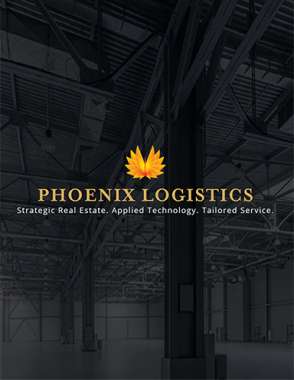How Does the Inflation Reduction Act Impact Industrial Real Estate?

If the Inflation Reduction Act is to meet its goal of reducing carbon emissions by 40% by 2030, the industrial real estate sector will have a part to play.
The Inflation Reduction Act
President Biden signed the Inflation Reduction Act (IRA) into law on August 16, 2022, which, among other things, dedicates substantial federal investment into clean manufacturing and energy production.
This legislation could have far-reaching impacts on the future of the industrial real estate sector, as new tax credits and government incentives will change the way architects and property owners design and develop new industrial buildings.
4 Areas Where the IRA Could Change Industrial Real Estate
If the Inflation Reduction Act is to meet its goal of reducing carbon emissions by 40% by 2030, the industrial real estate sector will have a part to play. Though the legislation remains relatively new, it’s becoming possible to see how it could have an impact on the industrial real estate sector. Assuming the sector falls in line with the IRA and its goals, the following four areas could see significant changes.
Construction
The construction sector has struggled to keep pace with skyrocketing building costs in the face of labor and building material shortages. This volatility resulted in a predicted 14.1% increase in building costs in 2022. Builders have been forced to absorb these high costs and hope the market will stay strong enough to recoup them.
With the IRA in play now, however, developers can offset higher building costs with a variety of tax incentives so long as they create energy-efficient buildings. As a result, new constructions will most assuredly aim to capture the incentives laid out in the IRA as a best practice. At the same time, in-progress projects will likely strive to shift gears and incorporate enough green elements to qualify.
Another interesting line item in the IRA has to do with cleaning up pollution in disadvantaged communities. This could provide opportunities for developers who seek to clean up blighted industrial properties.
Real Estate Investment Trusts (REITs)
Many real estate investment trusts (REITs) have aggressively pursued industrial properties in recent years in response to the e-commerce boom that followed the COVID-19 pandemic. As such, many of these trusts now have substantial industrial holdings that could be ripe for a green makeover.
REITs were previously ineligible for most energy-efficient tax reductions. Under the IRA, however, REITs have become eligible for tax deductions ranging from $2.50 to $5.00 per square foot. In addition, REITs have further been incentivized to invest in clean energy and EV charging stations.
Manufacturing
Establishing a robust domestic clean energy supply chain is a top priority for the IRA. The legislation creates significant opportunities for U.S. manufacturers of solar panels, batteries, carbon capture systems, electric vehicles, and wind turbines to establish U.S. operations. At the same time, tax credits for purchasing and implementing these technologies should drive steady demand for those manufactured products.
In theory, the IRA could inspire U.S. companies operating in these areas to reshore production to U.S. soil, adding more progress to the reshoring movement currently happening in the United States as businesses decouple from China. However, the National Association of Manufacturers (NAM) has vocally opposed the IRA, claiming that the 15% minimum corporate tax in the bill will inhibit the growth of U.S. manufacturers.
Supply Chain
The IRA pushes the U.S. supply chain toward electric trucks by offering tax incentives that help to offset the additional cost of choosing electric over diesel or encourage the purchase of smaller electric vans and trucks. If the U.S. freight sector shifts to electric, every warehouse and factory will need EV charging infrastructure to accommodate carriers. On that note, the IRA also includes significant tax credits for building EV charging stations.
Overall, the IRA may add to the high demand for suitable warehouse space as clean energy businesses begin to establish themselves. Energy-efficient retrofits of existing logistics infrastructure should also rise in popularity. The IRA seeks to offset the high cost of energy-efficient retrofits, which have previously made building owners wary of new green investments.
ABOUT PHOENIX INVESTORS
Founded by Frank P. Crivello in 1994, Phoenix Investors and its affiliates (collectively “Phoenix”) are a leader in the acquisition, development, renovation, and repositioning of industrial facilities throughout the United States. Utilizing a disciplined investment approach and successful partnerships with institutional capital sources, corporations, and public stakeholders, Phoenix has developed a proven track record of generating superior risk-adjusted returns, while providing cost-efficient lease rates for its growing portfolio of national tenants. Its efforts inspire and drive the transformation and reinvigoration of the economic engines in the communities it serves. Phoenix continues to be defined by thoughtful relationships, sophisticated investment tools, cost-efficient solutions, and a reputation for success.
More Supply Chain 24/7 Content from Phoenix Logistics
Article Topics
Phoenix Logistics News & Resources
4 Best Practices for Online Order Fulfillment In 2023 Is Industrial Real Estate Recession-Proof? 9 Tips for Offsetting Rising Parcel Rates Tips for Retaining Your Peak Season Temp Labor The Great Decoupling and What It Means for Industrial Real Estate How Does the Inflation Reduction Act Impact Industrial Real Estate? Not in My Backyard: Warehouse Edition More Phoenix LogisticsLatest in Business
Ranking the Top 20 Women in Supply Chain Microsoft Unveils New AI Innovations For Warehouses Let’s Spend Five Minutes Talking About ... Malaysia TIm Cook Says Apple Plans to Increase Investments in Vietnam Amazon Logistics’ Growth Shakes Up Shipping Industry in 2023 Spotlight Startup: Cart.com is Reimagining Logistics Walmart and Swisslog Expand Partnership with New Texas Facility More Business













